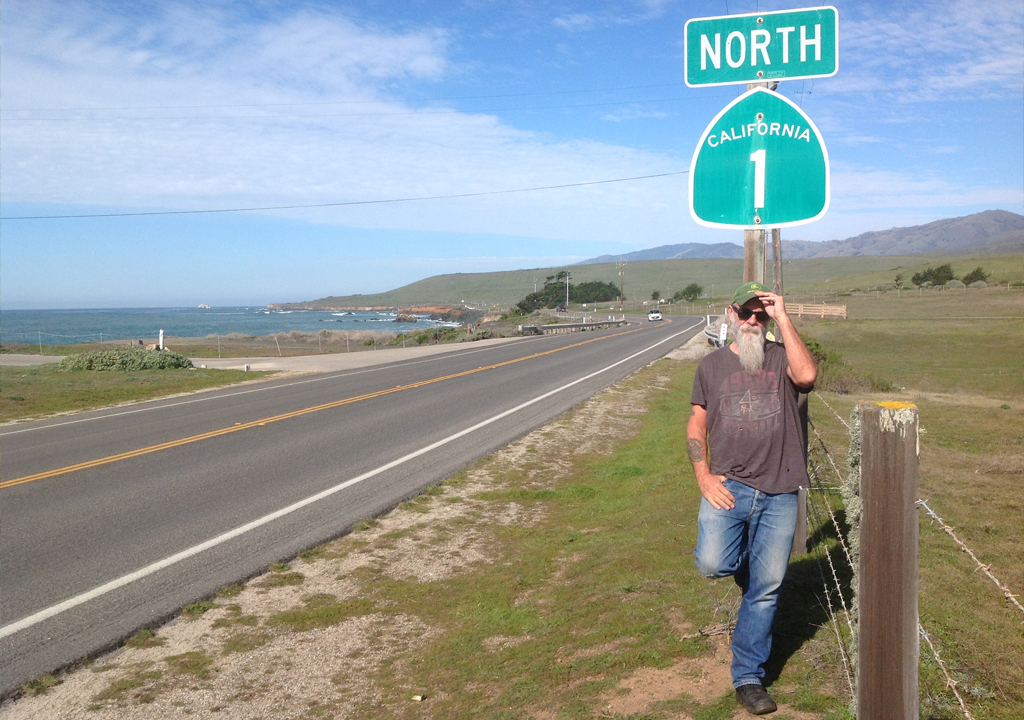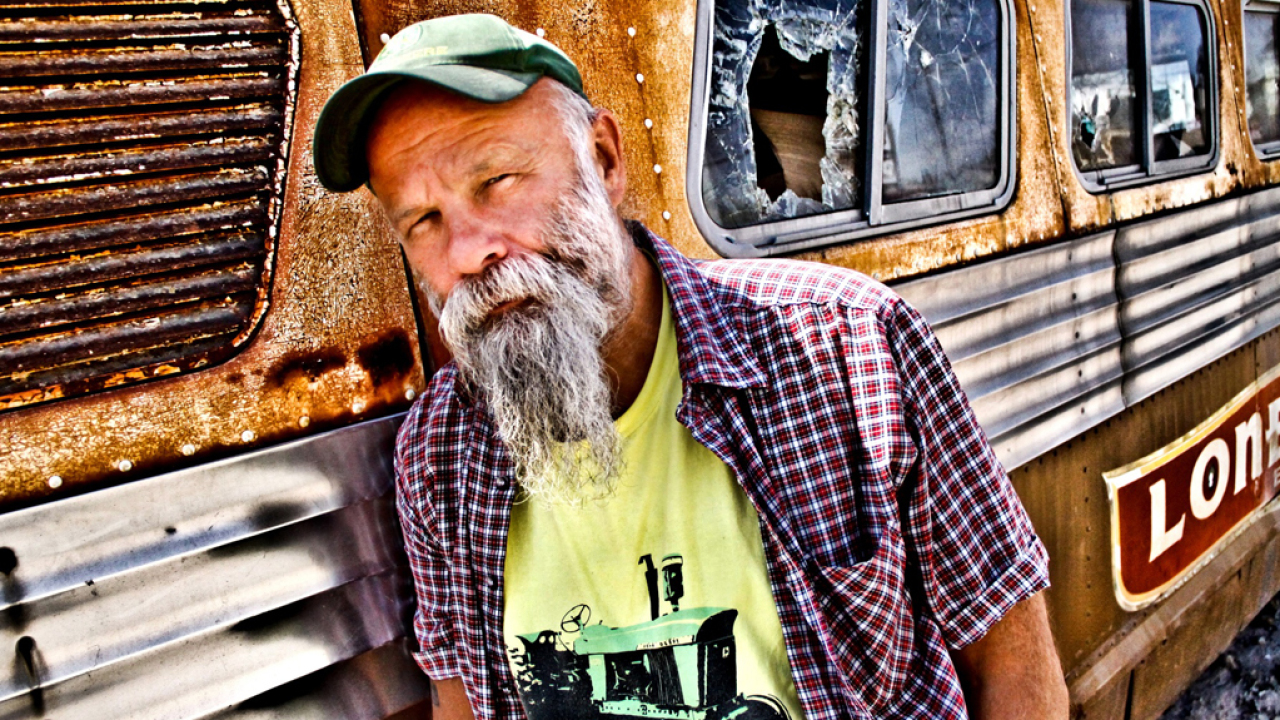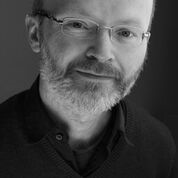‘Seasick’ Steve Wold was feeling more than halfway dead when he got the call that changed his life. The 65-year-old was slowly recuperating from a near-fatal heart attack, feeling weak and old and used-up; a part-time musician whose time had never come. He was persuaded to appear on Jools Holland’s Annual Hootenanny New Year’s Eve 2006 show anyway.
That night the nation saw a white-bearded bluesman, looking as if he’d just hopped off a freight train he’d boarded back in 1948. He played a three-string guitar as weathered as he was, which made a dirty, sandpaper-scraping, jolting sound. The song he sang, Dog House Boogie, told of a 13-year-old who’d run away from a broken, violent home and had been in some kind of trouble ever since. When Steve leapt from his seat to let that guitar warp against his amp, the 21st century’s least likely pop star was born. “It was only my heart attack that made me get out of my own way,” he ponders now.
“When I look back, any time there was any possibility of me doing something good, I’d always fuck it up. And there I was too weak and sick to fuck it up. But I almost did. Even when I got asked to do Jools Holland, I’d never heard of him, and I tried to not do that either. ‘I don’t feel good…’ And even when I went there, they wanted me to play Dog House Boogie, and I didn’t wanna play it. I was just that weak that I said: ‘Aww, okay.’” The avuncular, Jools-friendly Seasick Steve often seen on TV after that, somewhere between a Delta blues Santa and a novelty act, missed most of what really made him special. Dog House Boogie’s lyrics described a kind of blues you have ‘your whole life long’. And anyone who saw Wold sing it as he played more festivals than anyone the next summer heard the whole story, of his stepfather’s violence and his cold contempt for the man. The emotional truth chilled bones in the sunniest fields. Maybe that’s why a man whose anonymous, itinerant years saw him get to know everyone from Son House to Kurt Cobain now has Jack White and John Paul Jones for friends. Wold believes he has the heart attack to thank for it all. “I was just sick,” he remembers. “So I sat still there, and made that record [2006’s_ Dog House Music_ album, a Top 40 hit] in my kitchen. I literally had to get the fuck beaten out of me. And then all of a sudden, I was down to the nitty-gritty, where I guess things live. Fuck, seems pretty clear to me now that if things would’ve gone a different way, I wouldn’t be here.”
When I last met Seasick Steve, in 2009 during his subsequent major-label contract days, we spent a merry afternoon sinking bottles of red in a posh Kensington hotel, served by staff who had only just got used to letting him through the door. Today he has instead used Airbnb to borrow a Kensington council flat’s homely comforts. “I probably haven’t stopped travelling since I saw you, hardly,” he explains. “So it’s really nice that we don’t have to go to restaurants, we can get up in the morning and make some oatmeal in the kitchen there. But shit, man, I’m…” He exhales meaningfully. Running on fumes? “Yea-heh!” he laughs. “It’s all good, though. I’ve got nothing to complain about. ’Cept for when people don’t turn up and give me a ride. I hate that…” The sunny, grateful face Wold has turned to the world since his success is under strain this morning, after a last-minute request from Chris Evans to appear on his Radio 2 show left him sitting outside waiting for a car his new label forgot to order. It’s a minor incident, but has left the 73-year-old, always prone to tiredness since his heart attack, jangled. The damage and melancholy of his hard past are easier to see. He takes his trademark farmer’s cap off to rub his balding head, and tries to focus on his excellent seventh album, Sonic Soul Surfer. Unlike its predecessor Hubcap Music – which featured guest stars such as Jack White and John Paul Jones – the big names have been dispensed with on a record that’s alternately rollicking and hauntingly reflective. Previous LPs have mostly mined Wold’s hobo years wandering across the US after he ran away from home, a phase of his life which ended in 1972. The man who subsequently raised three boys with his Norwegian wife of 32 years, Elisabeth, and sits here in old age, is now finally writing songs that consider a whole lifetime of blues.

“I’ve been making an effort,” he says. “I’ve been trying to pay attention a little bit. Because especially before I got well-known, songs just kinda came, and they were mostly memories. And no one was going to hear it anyway, so it didn’t really matter. But now at least I don’t disallow the present. I feel kind of… edgy. Because we’re playing so much for young people, and I’m having the best time of my life, it’s really important to me that I don’t bore myself with, ‘Oh the good old days of me.’ Because it wasn’t good then.” Heart Full Of Scars, a song title that’s literal, looks back with a battered old man’s regret. “That’s just thinking about my life, the bags you carry,” he says. “I think life gets imprinted on your heart. And my life got imprinted on my heart so much, it made it stop.” Though Wold’s actual tramping and freight-hopping across America finished more than 40 years back, another new song, We Be Moving, describes a marriage in which ‘We lived in sixty houses/That’s me doing the best I can.’ In an era when many rock and pop stars, like career politicians, haven’t done anything else, Wold also had 50 different jobs, pre-Jools jobs. Once he’d got away from his violent stepfather, why did he stay so restless? “Some of it’s getting two weeks’ notice, renting in the US,” he says. “But I am fucking restless. It just gets in your blood. If you start when you’re young, that’s the same time you’re supposed to be being formed by school or routines or maybe sports, whatever people do when they go to school. And my formation was wandering around. So then, man, I never really thought about it, that I was so rootless, ’til I got with my gal, and one day she put her foot down, when we moved to Olympia, Washington. Then I started thinking, ‘Goddamn. What’s the matter with me?’ I know I wasn’t like that before I left home. I didn’t wanna leave but now I know there’s nothing I can do about it. I mean, we just bought a little house in Norway, and I’m really gonna try to stay there, but I got back from Australia last week, and now I’m going to America. So that’s taken care of that!”

Olympia was where Wold met a pre-fame Nirvana, playing at the Surf Club the week he arrived. Kurt Cobain (“A nice boy, kind of shy”) ended up living in the apartment above him for a while. Using engineering skills he’d picked up during his 1960s tramping, Wold set up a basic recording studio, Moon Music, in the back of a music store, recording feminist indie-rock icons Bikini Kill and even briefly joining future US chart-toppers Modest Mouse, as he watched grunge’s rise and fall. The week before he blew his brains out, Cobain was casually chatting to his old neighbour Steve in an airport, ’til Courtney Love yanked him away, berating him for talking to riff-raff. Always the oldest, odd-man-out by then, 25 years earlier Wold was also the man in the corner of the picture partying with Janis Joplin in Haight-Ashbury (“She wasn’t like my buddy. She was someone I’d be: ‘What’s going on, Janny? Gimme something to drink…’”). Was San Francisco in 1966 the only time he actually felt like staying put? “Yeah! But I didn’t, because I’d get bored after a couple of weeks, usually, or have to work. Back in America then, it was pre-tty dull. Apart from San Francisco and The Village in New York, most of it was just like it had been since the 1930s. So then I’d wanna go back to the Haight and listen to music. You could live there really easy – you know, for nothin’. Just stay with people. And I was busking. The bands weren’t even famous yet, they were like everyone else.” Though only in his early twenties, Wold had been roughing it since 1955. Flower power and his abrasive, abused youthful self didn’t always see eye to eye. “Yeah!” he laughs. “That’s another reason why I would leave. Like if someone wanted to flip me shit, I’d smack ’em, then of course people’d look horrified at you. But I didn’t come from that neighbourhood. So sometimes I’d be, ‘Ah, I’ve gotta get out of here. All this peace and love…’ I actually got it. I liked what they were trying to do. It was just that I was a little bit restless, and a little bit rough around the edges.”
Pressed for more memories of Joplin and the Dead, though, Wold is reluctant to elaborate. He’s been raking over his youth in songs and interviews ever since that night on Jools Holland, and has had his fill today. Recalling his introduction to the blues is a different matter. Growing up as a kid in Oakland, California in the 1940s, original bluesmen such as KC Douglas had been casual workers in his neighbourhood. It was seeing Delta legends Son House and Mississippi Fred McDowell play which set Wold’s musical path. “Oh, I remember it like it was yesterday,” he says happily. “It was the most amazing thing I’d ever seen in my life, and nothing has ever even come vaguely close.” What were those bluesmen like, the first time he saw them? “They was old!” he laughs. “I grew up with a lot of that kind of music, and there were always my dad’s friends playing it, but I didn’t know you could do that, I didn’t know you could be that. I know seeing them let me express myself later. I know that something happened in me, where it was dawning on me that that’s my kind of music. So when all the electric [blues-rock] bands such as Paul Butterfield came, that wasn’t my thing. I liked the acoustic country blues. I tried to do it [in the 60s], played a few folk festivals, but then no one wanted to hear me. I would imagine I wasn’t very good. I was like a very bad copy.” Wold resists the notion that he’s a bluesman himself, mostly out of embarrassment at being compared to his old black heroes. “I play country music, in my brain,” he says, “or hillbilly. Because when I think of a blues person, I think of Skip James, or Son House. I don’t fit in that category any which way, for me. I’m a white guy, a few times removed.” Wold hasn’t repeated his British success in his homeland (he recalls a US Warner executive sniffing, “We’ve got one of him in every state of the Union”). Still, Jack White signed him to Third Man Records for his previous two albums, You Can’t Teach An Old Dog New Tricks and Hubcap Music. Maybe blues fanatic White saw Wold, now older than Son House was in the 60s, as a similarly authentic old-timer? “I wonder,” he muses. “He’s so well-versed in the old music. He probably wondered what I was about a little bit, because I was getting drunk and shit, over there [in Nashville]. I think we kind of grooved on each other. He knows I have deep respect for him. He’s full of himself, but he’s also a genius, you know. But I do understand now how I look to a lot of people. I mean, in Haight-Ashbury, Timothy Leary and Allen Ginsberg were only in their forties, and they looked ancient. They were so old they shouldn’t even be breathing! So now when I’m at these festivals, it must be so weird to see me, when you’re 20. I also feel like I’m 20. Maybe younger. It’s just the body that’s getting crumply.”
The least-examined phase of Wold’s life came just before its transformation in 2006. Five years earlier, his wife Elisabeth wanted to move back to Norway. He remembers his time there like a final fall into purgatory. “It was horrible,” he says with feeling. “We got kind of fooled into going to that particular town. It was a blues town supposedly, and they said that there were 150 blues clubs in Norway – fuck, I didn’t know one blues club anywhere where I lived in America. But there were no clubs at all – they meant associations. Like a sewing club. They just get together once a month and have coffee, aww, aww…” He laughs ruefully. “We were struggling, my wife was working at an old people’s home. I was doing recording there, at my own studio, but it was not going well, because it was just a stupid town we lived in, and the bands were stupid, mostly. We were slowly losing everything we had. I thought maybe if I made a record [his 2004 debut, aptly titled_ Cheap_], we could make some bar gigs. And we did, a little bit. But within six months of making that record, I had a heart attack.” Even before his illness, after all the years of wandering, had his life ground to a halt? “Oh, yeah,” he says with feeling. “It hit the bottom when I got the heart attack. But before that, everything was heading down. ‘What happened? Why are we here?’ I mean, I knew my wife wanted to go there, but it was a drag. She would be very mad if I was talking bad about Norway, so I better watch my mouth, but I see it now kind of clear. It was almost like I had to hit the bottom, before this thing could happen for me.” The most atmospheric song on his new album, In Peaceful Dreams, draws on earlier times, when he tramped through and lived in the blues’ southern heartland. It describes somewhere haunted by dark deeds. “You know what a holler is?” he asks. “It’s like a valley. And there’s a lot in Kentucky especially, these hillbilly places that people live where it’s a little bit nasty, and a lot of shit goes down that never comes to light. Especially down where I used to live, there was a huge battle there. But it’s really about me thinking: ‘Oh man, the trees seen a lot more than that.’ And they just sit there, and we come and go, and for the most part, they’re still standing.” Seasick Steve saw most things come and go, too, before anyone looked at him. He still seems fragile from the morning’s exertions as we part. “Sure wish I could have a glass of wine now,” he sighs meekly, then catches himself. “What am I talking about?” this still-free, wandering man remembers, reaching for a glass. “I can have some wine whenever I want.”

